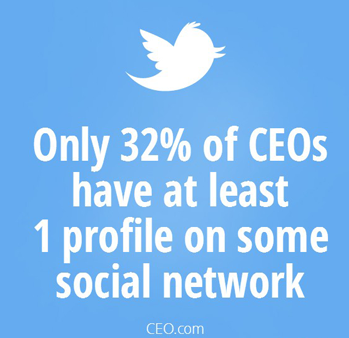Expressing Opinions While Protecting the Brand - How CEOs Should Manage Their Social Media

Chief executive officers (CEOs), first and foremost, must be visionaries. Their vision should be inspired by their personal beliefs, ideologies, needs and values. From this vision, the CEO draws his or her creativity and passion to achieve long-term objectives. At a fundamental level, the CEO is the brand and the product is the result of their vision, inspiration and creativity.
The strongest brands involve products that people associate with a specific need or, conversely, which they believe go some way to contributing to their personal identities. Whatever the product is, it needs to be accepted in the market through various marketing/promotional strategies. Social media is a medium where a message can be amplified through word of mouth, content sharing and discovery. For that reason, a CEO must be the first spokesman to amplify the product message by maintaining a public profile on social platforms and a personal blog/website. However, his/her personal social media activities depend greatly on the nature of their product and industry.
Does Your CEO Need Social?
 Traditionally, marketing and public relations executives have been responsible for advocating and communicating the message around a product and its benefits to the public, while the CEO has been charged with "shaping the market" as a thought leader. However, the CEO shouldn't stop there. He/she must also become the face of the company on social media - just as they are expected to represent the company offline. For example, Steve Jobs, Mark Zuckerberg, Bill Gates and Richard Branson are some of the numerous CEOs that are known to the public because their companies have created products that impact and add to the consumer's identity (iPhone, Facebook, Windows, Virgin Atlantic). In these cases the CEO inevitably becomes the face of the product. We, as consumers, relate these products that add to our identity to the person and visionary behind the brand.
Traditionally, marketing and public relations executives have been responsible for advocating and communicating the message around a product and its benefits to the public, while the CEO has been charged with "shaping the market" as a thought leader. However, the CEO shouldn't stop there. He/she must also become the face of the company on social media - just as they are expected to represent the company offline. For example, Steve Jobs, Mark Zuckerberg, Bill Gates and Richard Branson are some of the numerous CEOs that are known to the public because their companies have created products that impact and add to the consumer's identity (iPhone, Facebook, Windows, Virgin Atlantic). In these cases the CEO inevitably becomes the face of the product. We, as consumers, relate these products that add to our identity to the person and visionary behind the brand.
On the other hand, a company that creates a product that doesn't necessarily add to our identities and isn't personal in nature, but obviously fills a need, doesn't require consumers to draw a link between the product and the CEO. Simply put, we buy cleaning products because they address a fundamental need. We buy Apple products because we know about Steve Jobs, the incredible innovator behind the company and its products.
CEOs must understand where they fit into these two scenarios because they can determine the success of a brand's activities online and on social media. The CEO of a product that is personal in nature to the consumer (adds to their identities) should be genuine and bold both on social media and in real life. They need to exude authenticity and passion because we, the consumer, are watching and basing our purchasing decisions on our perception of them. We ask ourselves if we want to be associated with this person by purchasing their product. Again, you don't have to look much further than Apple to see how proud and loyal those consumers are to own those products and to be a part of that group. However, a CEO of a company/product that isn't personal in nature shouldn't behave in the same bold way on social media, because consumers don't link the CEO and those products together. The danger is that a disconnect could potentially happen where consumers pass judgment on that CEO's behavior.
Social Reign
By nature, a CEO is a leader and not a puppet (or at least they shouldn't be) and therefore they should be genuine on social media. As soon as shareholders, executive teams and strategists influence their CEO's online behavior, there is a problem. The CEO is no longer being genuine and the connection between his/her vision has been disrupted. When this happens, it's time for someone to leave the company. He/she will no longer be creative, because creativity is a way to express authenticity and to address personal needs and philosophies. He/she will also cease to be the company's visionary, as vision drives creativity. So, either the CEO steps down or the influencers move on.
CEOs not only need to manage the direction of the entire company, they also need to manage the company's image by acting as the chief spokesperson - the one who sets the tone for the entire brand. This includes their presence on social media. When it comes to the social sphere, a CEO obviously needs to be very careful. They are accountable for the company/shareholders in terms of whatever they say and do online and off. Their opinions can be taken out of context on social media, as information can be amplified, instantaneously transmitted and easily misinterpreted.
This is why having a reference such as a social profile/blog to allow people to forge their own opinion or to easily validate anything they hear online/offline about the CEO is key - regardless of his or her industry.
CEOs are social animals too. They have the right to use social media to communicate and share with family and friends. However, for all of the reasons outlined above, they should use separate and/or private profiles to share more sensitive information. When so much is at stake, approaching social media the right way with the right understanding and intentions is critical.
Jean Dobey is the founder and CEO of Hibe, a company that develops personal networking and social engagement technologies. An entrepreneur with more than 15 years of experience building ecommerce and social media companies, Jean is committed to enabling people and organizations to communicate and engage online in a way that reflects their different personas and needs.
Subscribe to Our Newsletter!
Latest in Social Media










